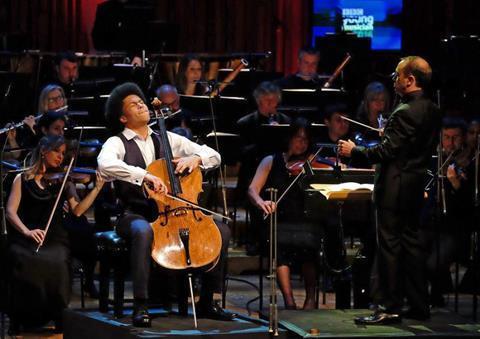Artists including Sheku Kanneh-Mason, Nicola Benedetti and Jennifer Pike have condemned the move to close the BBC Singers and cut 20% of salaried orchestral posts

Read more news articles here
Twenty-two winners of the BBC’s Young Musician competition have written an open letter to the corporation’s director general Tim Davie, asking him to reconsider the BBC’s decision to disband the BBC Singers and reduce the number of salaried positions in the English BBC Orchestras by 20%. The musicians include violinists Nicola Benedetti and Jennifer Pike, and cellists Sheku Kanneh-Mason, Guy Johnston, Natalie Clein and Laura van der Heijden.
In their letter, the musicians refer to the latter decision as ‘a baffling choice’ and argue that the reduction ‘is seemingly opposite to your aims, especially in terms of the quality and diversity of repertoire you presumably want to invest in, but also because it stifles possibilities to perform the greatest repertoire at the highest possible standard and makes it more difficult to help hard-working and under-resourced classroom teachers keep music in children’s lives’.
‘We fear this hugely damaging increase in the pace of classical music in the UK following on from the savage cuts in the recent round of Arts Council funding will do permanent harm, and we cannot sit and wave goodbye as we watch it pass by.’
Read: BBC announces 20 per cent cut in salaried orchestral posts
Read: UK classical musicians struggling following years of funding cuts
Read more news articles here
The letter comes a day after more than 700 composers signed a letter to Mr Davie condemning the ‘devastating’ closure of the BBC Singers. The letter said: ’“You say you are looking for agility and flexibility in your future choral provision: you already have it. No other UK ensemble can match this amount or breadth of activity across the spectrum of choral styles and genres, nor achieve stunning results so quickly in any situation.’
Below is the text of the BBC Young Musicians letter in full:
We are writing to express our collective dismay and disbelief about your decisions not only to cut twenty percent of orchestral positions across the English BBC Orchestras, but also to completely disband the BBC Singers on the eve of their one hundred birthday.
The Singers quite simply represent the very ensemble that you state you are searching for in your mission statement – their agility and flexibility are world class and their unique skillset is in no small part because of the stable, salaried, core group who sing together on a daily basis. This is simply not found anywhere else in the UK choral scene, and it allows them to tackle a huge variety of projects ranging from complex contemporary music to performing as backing singers for the Pet Shop Boys. They are recognised worldwide as advocates of choral singing and are also an inspiration to the millions of amateur singers in the UK. They help to sustain the work of living composers (equitably divided by gender), give workshops and performances, and are tireless in their quest to bring choral singing to as many children as possible through their highly esteemed education programme. It is telling that the Singers’ budget is similar to the licence fee of a mere ten thousand people yet the petition on change.org currently stands at over one hundred thousand signatures and continues to rise. The UK’s ‘Jewel in the Crown’ of choral singing is something to be cherished, not abolished.
Similarly, the decision to cut one in five players from the BBC Symphony, Concert and Philharmonic Orchestras is a baffling choice even in the current difficult financial climate. This 20% reduction of a uniquely highly trained, very experienced and uniquely skilled workforce is seemingly opposite to your aims, especially in terms of the quality and diversity of repertoire you presumably want to invest in, but also because it stifles possibilities to perform the greatest repertoire at the highest possible standard and makes it more difficult to help hard-working and under-resourced classroom teachers keep music in children’s lives. It will also release more players back into the insecure and unstable freelance world, which is already under great strain given recent seismic national and international events. Seeing the possible pool of work contract in such a drastic way does nothing but harm to the morale of young musicians that have just finished or currently training and to those considering it.
The aspect of New Music and living composers is especially acute. At a time when quite correctly far more people from previously excluded groups, including women and people of colour, are finding their voices are being heard as composers; with their special emphasis and skills in handling brand new work we have never needed the BBC Orchestras and BBC Singers more. We fear this hugely damaging increase in the pace of classical music in the UK following on from the savage cuts in the recent round of Arts Council funding will do permanent harm, and we cannot sit and wave goodbye as we watch it pass by.
Mr Davie, you say that you are in listening mode – please listen not only to us but also to the thousands upon thousands of people in this country who are protesting against these decisions, and, just as the highly distinguished and respected Principal Conductors and Associated Artists of your orchestras and ensembles have said, we are also open to dialogue and discussion.
Former and current BBC Musician Winners: Jordan Ashman, Martin Bartlett, Nicola Benedetti, Alan Brind, Natalie Clein, Nicholas Daniel, Michael Hext, Emma Johnson, Guy Johnston, Sheku Kanneh-Mason, Freddy Kempf, Nicola Loud, Anna Markland, Lara Melda, Peter Moore, Jennifer Pike, David Pyatt, Mark Simpson, Adrian Spillett, Laura van der Heijden, Rafal Zambrzycki-Payne, Lauren Zhang. NB. Fang Zhang is currently uncontactable in China.
Read: Artists and musicians speak out against proposed 50% funding cut to arts
Read: ‘We are facing the loss of our livelihoods’: Petition to save ENO from funding cuts
Read more news articles here











































No comments yet